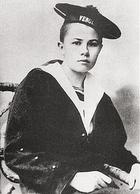
Isabelle Eberhardt (17 February 1877 – 21 October 1904) was a Swiss explorer and writer. She was educated in Switzerland by her father, who was a tutor, and published short stories under a male pseudonym as a teenager. She took an interest in North Africa and wrote about the area with "remarkable insight and knowledge" despite having only heard about it via correspondence. Upon invitation Eberhardt relocated to Algeria in May 1897, where she dressed as a man and converted to Islam, eventually adopting the name Si Mahmoud Saadi. Eberhardt's unorthodox behaviour made her a social pariah from both the European settlers in Algeria and the French administration.
Eberhardt was accepted into the Qadiriyya, which convinced the French administration that she was either a spy or an agitator. She survived an assassination attempt shortly thereafter. In 1901 she was ordered to leave Algeria by the French administration though was allowed to return the following year after she married her long-time partner Slimane Ehnni, an Algerian soldier. After returning to Algeria she found employment at a newspaper and also worked for General Hubert Lyautey. In 1904 she was killed in a flash flood in Aïn Sefra at the age of 27. The majority of her writings, which found critical acclaim, were not published until after her death. Anti-colonialism was a regular theme of her writings.




